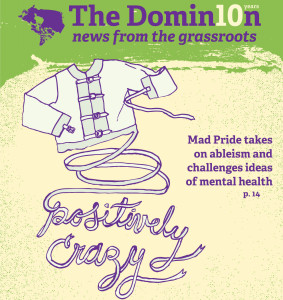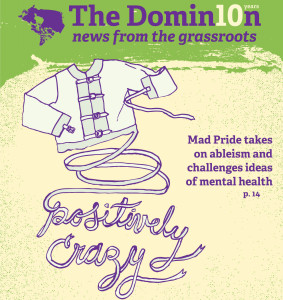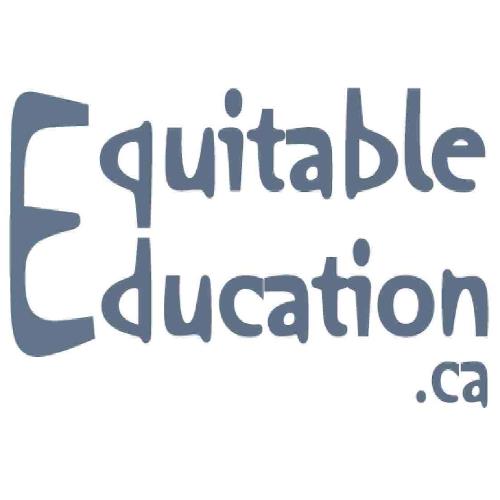PDF versions (for offline reading, use as handouts):
- Four 8.5×11 pages (single- or double-sided printing)
- Two 11×17 pages (double-sided printing then fold)
—-

Illustration by Emily Davidson.
Mental health awareness is gradually gaining ground, and so are radical alternatives to mainstream approaches. Community-based initiatives by and for the so-called crazies amongst us tend to be kept under the radar in Canada, challenging discrimination, providing peer support and advocating for a diversity of perspectives on mental health, its treatment and justice.
Grassroots movements around mental health have a rich and often unacknowledged history, with many activities falling under the relatively recent name of Mad Pride. The movement is also sometimes called the C/S/X movement, which stands for Consumers (of mental health services), Survivors (of the psychiatric system), and eX-patients (who have moved on to live outside the mental health services systems).
Although diverse perspectives exist on diagnoses and labels, Health Canada statistics from a 2002 report categorize Canadians as living, or having lived, with: schizophrenia (one per cent), bipolar (one per cent), major depression (eight per cent) and anxiety disorders (12 per cent).
“We face common barriers, common challenges, common problems with our lives, that aren’t about our individual well-being and some struggles we face because of it, but because of real societal challenges and discrimination that’s put into practice in the way our institutions and societies run,” said Elizabeth*, who is active in the Greater Toronto Area Mad community.
People with “mental health histories” face barriers to employment, housing, obtaining credit, attending school, having, adopting or keeping custody of children, divorce, finding a family physician who will treat medical concerns aside from mental health, and making decisions about one’s own life, said Elizabeth.
The term “mentalism” is used by Mad activists to describe “discrimination against people who have been labelled with mental health concerns or have perceived mental health concerns or previous involvement in mental health systems,” she told The Dominion. “It’s a form of discrimination…and it’s very prevalent, it’s pervasive in our culture, it covers everything we do.”
Some Mad activists relate mentalism to ableism—discrimination against people with disabilities. Others don’t see themselves as disabled or subscribe to the notion that their mental experiences are necessarily illnesses. But discrimination and challenges are widespread, including in progressive circles and activist communities.
Abla Abdelhadi, a Palestinian activist living and organizing in Ottawa, has been surprised by the lack of support for her in dealing with mental health related issues.
“It’s almost like, ‘Get better, and then when you do get better, come back and join us,’ as if struggling through and surviving through having mental health issues—in a capitalist, colonial, racist society—has no room in our struggles, and we don’t often talk about that,” she said.
Abdelhadi says she experienced criminalization, detainment, forcible hospitalization, assault and torture during her first manic episode while visiting the US two years ago. Since then, she has also experienced ableism within the activist community while dealing with trauma and working to fight her charges, fundraise and find support.
“It was like a wake-up call,” said Abdelhadi. “It…made me realize why we need to talk about community interdependence, and why all our movements have to have disability justice intersecting everything we do.”
For many, being able to talk about it, being heard and being supported is huge. Devin Mahnke recently co-founded an Icarus Project group in Calgary and has seen the importance of peer support. The Icarus Project is a “radical mental health support network” with online forums, various resources, and autonomous local groups. Icarus celebrates its tenth anniversary this year.
“It doesn’t seem to carry any sense of authority with it,” he said of peer support. “We’re just a group of peers listening to and helping one another, rather than a top-down organization.”
The group has brought together people who find the system doesn’t work for them, providing a safe space to discuss issues. In this space where they can be better understood and not judged, they also share how they are doing in their own lives. “It sounds really simple, but that’s actually been one of the more profound elements of our meetings because a lot of people don’t ever have a space to do that,” Mahnke told The Dominion.
Key principles of support work include “sharing stories, sharing experiences, sharing things that work for us, and sharing practical ways that people can use to get on with their lives ” said Kevin Healey.
Healey is part of the International Hearing Voices Movement and has run a support group in Toronto for the past two years. Getting to the point of speaking up and speaking out was a long journey for him.
“It took me 40-something years before I could feel confident enough to stand up and say ‘I hear voices’ in a room full of people,” he said. “People don’t talk about it, so you don’t hear people talking about it, so you think you can’t talk about it. We’ve created this vicious cycle and that just creates more shame and more fear, because anybody who hears voices knows exactly what kind of response they’re going to get when they tell somebody.”
Different studies report different rates, but by Healey’s estimate, approximately one in 10 people hear voices at least on occasion. The majority of these people have no contact with the psychiatric system, he adds, and those who do hear disturbing or disruptive voices often have a history of trauma. He notes that medications turn off the voices for a small percentage of people, and might help others feel less overwhelmed, but even then there can be significant negative side effects.
Healey would like to see psychiatric services change; he and the movement he is part of organize to form working relationships between “experts by experience” and “experts by training” to promote and practise a pluralistic, patient-directed approach.
“Really what our approach is about is…what you do when you’re with somebody. Simply, we aim to create safe spaces so that people can come to you and talk about their experiences whether it’s voices or visions or whatever it is,” he said. “We’re all running around trying to find ways to fix people—maybe what we really need to do is sit and listen, more than anything. That’s the basis of our approach, and it’s the basis of so much peer work: just listen.”
He adds that knowing recovery actually happens, and “believing that people will find their way through, that it’s not something they’re stuck in forever,” really helps.
Healey takes opportunities to appear in various media to help more people see that there are other ways of looking at things and finding ways to support people without having “the” answer to it all.
“Part of what we’re trying to do is just to show people that this is a normal human experience a lot of us do get, and a lot of us learn how to deal with it,” he said.
Normalizing or naturalizing—as opposed to pathologizing—a diversity of mental experiences is not necessarily the goal of most mainstream mental health awareness campaigns.
These campaigns “really like talking about ‘signs’ and ‘symptoms’…like stress, or sadness, or suicide [ideation] sometimes, or anxiety related things, and then they often tell you how to refer people to specific resources like mainstream services: GPs [general practitioners], family physicians, psychiatrists, crisis lines, hospital care,” without also mentioning these resources may be problematic, said Alisa*, who is active alongside Elizabeth in the Greater Toronto Area and Hamilton.
She describes mainstream mental health awareness campaigns as a kind of “wellness for all” approach that promotes individualistic coping strategies at the expense of helping people view themselves “as a [Mad] community that has history and culture and a social justice movement.” She’d also like to see awareness geared towards alternative approaches and individuals being able to self-determine treatment options.
Personal stories can be powerful tools to find meaning, re-shape imposed identities, and provide inspiration, but Alisa sees problems with the way personal recovery narratives are often highlighted in awareness campaigns. “Those stories, they never name discrimination, all they talk about is a medical kind of construction around what does suffering look like and a medical construction of understanding of getting better or a cure.”
Elizabeth agrees, adding that the narratives don’t often reflect the reality of people’s lives.
“You’re told to tell these inspiring recovery stories that look like, ‘Bad. Did something. Got better,’” she said, adding that more often, the real “getting better” part is finding ways to move forward despite ongoing challenges. Elizabeth sees the former approach as simplified and patronizing.
“When you think the only thing people can add to the conversation is their personal stories, you’re really missing out on a whole bunch of knowledge and history that an entire community of people has that can make change and make things better,” she said.
This knowledge includes “tips and tools that people learn by being in the systems and how we survive those systems,” said Elizabeth. “That’s all information that people have as a community that isn’t written up in books or available in journals or in some guide to coping with your mental health.”
Alisa feels that shifting the perspective from “individuals with illness” to Mad people collectively as an “equity seeking group” is something that needs to happen.
“If we can’t see that other people are seeing this as a problem and it’s not just you and that there’s actual infrastructure in place that is causing problems for lots of people, then you can’t change anything. If it’s only focused on the individual, the only thing you can change is yourself and what are your options there?” she said.
It can be a challenge to find groups of C/S/X people, according to Elizabeth, because often the work happens in small community groups. And that work “can look very different from what people expect to see activism [or advocacy work] to look like,” she said.
Celebration is a part of the activism too. “It’s part of self-care for people. And it’s part of being able to get through life—finding the things that you’re proud of,” said Alisa.
Abdelhadi is happy to celebrate her resilience after what she went through, but wants to ensure that not just certain experiences of Madness are centred in the C/S/X movement and that intersections are taken into consideration. “I’m someone who’s experienced police and state violence because I’m a racialized woman, because I am Indigenous Palestinian, so I can’t separate the ableism I experience from the state from the racism I experience,” she said. “For me, it’s really important to maybe start something in Ottawa for other folks who are racialized or colonized who are survivors of state ableist racist violence.”
For Abdelhadi, mental health activism needs to be rooted in a framework that recognizes the interconnection of structures of violence and works to dismantle them, drawing upon the analysis of disability justice writer and organizer Mia Mingus, a queer physically-disabled woman of colour. Better access to mental health resources is important, says Abdelhadi, but so is understanding how ableism is interconnected with racism, colonialism, capitalism and cis-gendered heteropatriarchy.
“One of the things I’ve been learning from a lot of disability justice activists is bringing back the body, or the human being, into our work. I find we often talk about anti-oppression, decolonization, anti-capitalism and how all these oppressions work and how we’re struggling against them, but we don’t often bring back the body or the human being,” said Abdelhadi.
One of the hardest things for her was feeling like she was starting from scratch in Ottawa. Even as a resourceful activist with plenty of experience and connections, figuring out how to deal with lasting trauma while working on her legal case was extremely challenging. Finally building the community she needs to survive, she is also sharing her story publicly.
Raising awareness about Mad communities’ experiences, challenges and initiatives also sets the stage for the transformation of support systems and solidarity.
“Solidarity is not just on this theoretical level; solidarity is solidarity at the community level where we organize—me being in solidarity with you, and figuring out what we all need as a community, the things that we are not getting from the capitalist, racist, colonial, heterosexist cis-gendered state,” said Abdelhadi. “We have to do that work in our own communities. We have to create those spaces where we’re supporting each other as a whole human being, and not only when you can function with these ableist notions of a ‘super activist.’”
* At their request, Alisa’s and Elizabeth’s last names have not been included.
—-
About the author: Greg Macdougall identifies as Mad and/or disAbled, lives in Ottawa (unceded Native territory), and is active in community organizing, Indigenous solidarity and media work. His website is www.EquitableEducation.ca
About the editor: Sandra Cuffe helped bring this article down from a draft length of 3500 words to the final polished 2100 word version. She is a member of the Editorial Collective of The Dominion, and has been involved with the Vancouver Media Co-op. Some of her own writing can be found here (VMC) and here (The Dominion).
This article was originally published by The Dominion.
Print versions (for use as handouts):
- Four-page 8.5×11 PDF (single- or double-sided printing)
- Two-page 11×17 PDF (double-sided printing then fold)
Interview with the author Greg Macdougall (18min) (mp3 file)
May 14, 2013 on OPIRG-Carleton Roots Radio CKCU 93.1FM (also on SoundCloud):
—-
RESOURCES:
- National Network of Mental Health: www.nnmh.ca
- Canadian Coalition of Alternative Mental Health Resources: www.ccamhr.ca
- MindFreedom: www.mindfreedom.org
- The Icarus Project: www.theicarusproject.net
- Mad Students Society: www.madstudentsociety.com
- Intervoice – International Community for Hearing Voices: www.intervoiceonline.org
- Leaving Evidence (Mia Mingus): leavingevidence.wordpress.com/
- Madness Radio: www.madnessradio.net
- Crazy Boards: www.crazyboards.org
- Mad In America: www.madinamerica.com
- RecoveryNetwork: Toronto: recoverynetworktoronto.wordpress.com/
- “Justice For Abla” group on Facebook: https://www.facebook.com/groups/296266780402594

 Interdependent media & in-person learning opportunities for those who are inspired to be part of movements for social justice.
Interdependent media & in-person learning opportunities for those who are inspired to be part of movements for social justice.
Loved this article and the progressivism in many pockets off Canada. Wanted to suggest another radically respectful and diverse family support org in Toronto, Family Outreach and Response, http://www.familymentalhealthrecovery.org.
hi Jennifer, glad you liked it. and thanks for sharing that link! i checked it out, a pretty cool initiative.
i’m not going to add it in to the links in the actual article, b/c i want it to stay consistent with the print version, but the first two links i provided (nnmh and ccamhr) were with the intent that they contain links to organizations in different communities across the country, so if FOR isn’t yet listed in their listings, i’d urge you to contact them and get it included.
thanks again!
Good article. I think you highlighted a very important point that our healthcare system has loose ends which we need cleaned up. The link said that the cost of mental health is over $7 billion per year to Canada; I recently learnt that depression costs Canada $12 billion per year. Nevertheless, mental health is too costly socio-economically. I think Elizabeth May recently wrote about the rising cost of healthcare is due to pharma costs which can be controlled. I wonder what the balance of your article said. It would be great to hear what physicians have to say also.